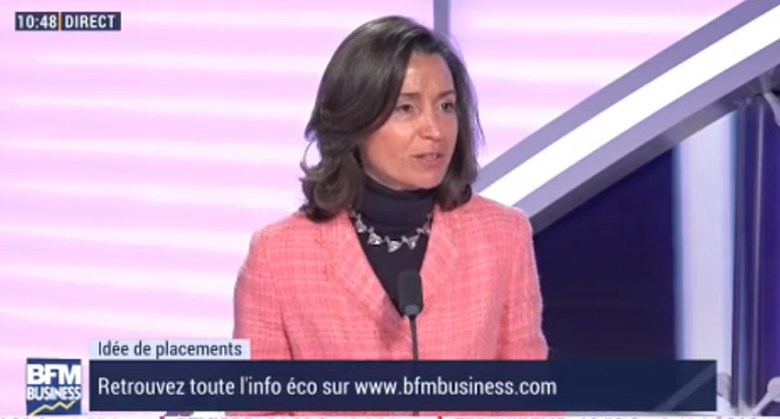
Responding to Cédric Decoeur’s questions on France’s BFM Business programme, Angélique de Lencquesaing this week touched on French export figures for wine and spirits, as well as the impact of the Coronavirus on wine investments.
Export figures for French wine and spirits for 2019 have been announced, and they show a slight growth – is this a good sign for the world of fine wine in terms of investment?
French exports of wine and spirits represented a total of €14 billion in 2019, an increase of 5.9% compared to 2018. This is a performance that should be commended in the context of such an agitated global market. We should note that, both in terms of volume and value, this progress was mainly carried by the spirit market (+8.8%) which has solidly established itself.
There are two things to be happy about here: firstly, French wine and spirits have remained attractive across the world. Secondly, the sector is still in second place after the aeronautical industry.
However, there are two things to watch out for: volumes sold have remained stable, at least for wine, so it is an increase in prices that has pushed the overall export figure up. We should also be careful of the slight illusion given by these figures.
An illusion?
Yes, a large proportion of this growth is due to orders that were made in anticipation of certain changes. In this respect, the first half of 2019 revealed itself to be particularly favourable, notably in a zone like the US. The top export market in value for French wine, consumers were anticipating – and they were proven right – an increase in import tax. And this is indeed what happened in October 2019. This meant that buyers, particularly professionals, created bigger stocks of wine before this date. Exports also increased by 5.5% in volume, and 16% in value across the year.
So that’s what happened in the US – did we see the same thing in the UK before Brexit?
Exports increased by 4.4% in value to the UK market. This growth is less than average but it remains nonetheless a positive trend. Here, again, an anticipation of change had its role to play. Though the British don’t seem to be particularly worried about the future.
What about Asia, particularly China?
In 2018 the percentage of wines exported to Asia had decreased by 14.4%, strongly impacted by trade tensions and the political situation in Hong Kong. In 2019, the overall trend has not shown vast improvements. The drop has continued, even if it is less marked (-6.4%).
And this was before the Coronavirus. Are you feeling the effects of the epidemic in the fine wine market?
The effects of the coronavirus in its COVID-19 form are far from measurable at present since the peak of the epidemic hasn’t yet been reached, so we have very few indicators in terms of figures.
If we consider the wine market at a broader level, the epidemic has of course affected the Chinese market, particularly in Hong Kong. This is a new blow for the market after the months of rioting that caused hotels, restaurants, and luxury shops to lose much of the business for which it relies on tourists.
In terms of sales made at iDealwine, how has this health crisis been felt, particularly regarding China?
At the end of February, in a very dynamic context since the start of the year on iDealwine’s auction platform (+18% in February compared to the same month a year prior), Asia represented 10.4% of sales in value. This is a slight decrease in relation to the average recorded in 2019 (16%), but it remains significant. Asian consumers massively increased their purchases last month, both at auction and fixed price (+30%). Does this perhaps mean that fine wines represent a safe investment for those who don’t wish to go out any more?
In this part of the globe, exports should inevitably level off. Indeed, the Stock Exchange drop for titles such as LVMH since the beginning of the year illustrate difficulties met by the luxury sector, and notably products like Champagne or Cognac, for whom China represents a strategic output.
Are consumers still drinking wine there?
The desertion of hotels and restaurants will impact the sale of wine in Asia for several months. However, when it comes to private consumption, this is holding up for the moment – buyers are still showing up on our auction platform.
There are two things to keep in mind to avoid giving in to discouragement:
- Fine wine, like many luxury products, are safe investments. Rare names can always be sought with the view to building an investment cellar, looking to the mid-long term.
- As long as logistics aren’t affected or disturbed too greatly, particularly looking at iDealwine, e-commerce can offer an alternative choice to the necessary limits on movement that have been imposed by health directives.
But the events and wine salons aren’t holding up?
Numerous salons and events for the wine industry have been cancelled or postponed one after the other, which does indeed risk weighing on the dynamism of the wine trade, since many of these cancellations concern professional salons: Chengdu in China, Prowein in Dusseldorf, Vinexpo in Hong Kong, Vinitaly…
And in France?
‘Les grands jours de Bourgogne’, an event that shines a spotlight on the best of Burgundian wines, ahs indeed been cancelled. All eyes are now turning to the traditional primeurs tasting week which looks likely to go ahead in Bordeaux on the 30th April. This is a major event for the region’s wine sector.
So the primeurs event is going ahead?
For the moment, yes, though the organisers are keeping a very close eye on how the situation is developing.
Having said this, there are several reasons for which a postponing to October might be opportune:
- Cancellations of other events will limit interest in Bordeaux’s primeurs. Many stakeholders in the industry come from all over the world to do a tour of the European events all at once, with Bordeaux being the final stop.
- Chinese consumers and professionals won’t be able to attend, since the coronavirus epidemic prevents them from travelling. China represents the top export market for Bordeaux wines.
- The Americans (2nd export market for Bordeaux wines), scalded by the import taxes imposed by the Trump administration, are hesitant to participate in the primeurs campaign. In fact, Wine Spectator magazine has said it will not be reporting on the tasting event…
For most wine enthusiasts, would the cancellation of the primeurs campaign have a major effect on their investment choices?
The effect will more likely be one of a delay. What does the deferral of a few months mean for the marketing of a vintage? It’s above all in the property’s treasury that the impact will be felt. For the buyers, whether they are intermediaries or consumers, this decision won’t have a major impact. Waiting a few months for the situation to stabilise and for the market outlook to clear up isn’t a bad idea. When there’s good news to present, like a high-quality 2019 vintage, it’s best to have a large and enthusiastic audience to present it to!
Furthermore, the market has some significant stock that it’s best to sell before putting a new vintage on the market. There are some wonderful opportunities that might emerge in the coming weeks and months…
Opportunities in Bordeaux?
Yes, of course! We shouldn’t forget that Bordeaux continues to be the most important region for French auctions. On the iDealwine platform, the region represented 40% of sales in value in 2019, and 43% in volume. A potential shortage of professional buyers could indeed open up some opportunities.
I mention Bordeaux for the excellent ageing potential of its wine, but other regions are evolving in very dynamic ways as well and should be followed closely. Our wine estimate service is an indispensable tool for this.
See the bottles for sale at iDealwine



